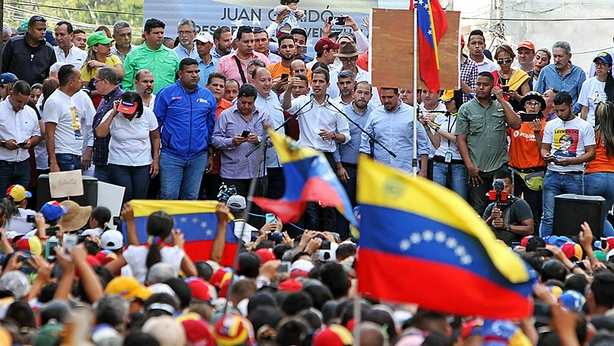Lights went out across much of Venezuela, including many areas of the capital city of Caracas, less than two weeks after power was restored following a prolonged blackout.
Power was out in much of eastern Caracas as well as downtown, where the Miraflores presidential palace and most government ministries are located.
Authorities said the Caracas subway was shutting down due to the lack of power.
Several western states had no power, though it remained on in the southern city of Puerto Ordaz and in parts of Valencia, the country's third-largest city.
Shops across the country closed early to protect against possible looting.
The blackout comes after electricity went out in much of the OPEC nation on 7 March, with reliable service restored only four to six days later in most major cities.
That blackout led to widespread looting in parts of the country and briefly paralysed oil exports.
Read more:
Venezuela's tale of two presidents
Russia condemns 'flagrant US interference' in Venezuela
President Nicolas Maduro blamed the earlier blackout on cyber "sabotage" by his US counterpart, Donald Trump, but former energy officials and local engineers said it was likely caused by a technical problem with transmission lines linking the Guri hydroelectric plant to the national power grid.
Blackouts have long been common in the South American country due to years of under-investment and lack of maintenance.
However, their increasing frequency and severity is adding to the desperation of Venezuelans, already living through hyperinflation and six straight years of economic contraction.
"It is horrible, it's a situation that we cannot tolerate," said Elizabeth Contreras, 50, who works as a cleaner in a bank in eastern Caracas.
She worried about how she would get home. "I have to go pick up my grandchildren - it's what makes me most nervous."

The outage earlier this month was the most severe in the country's history.
It took place as the country slipped into a deep political crisis after National Assembly President Juan Guaido invoked the constitution to assume the interim presidency in January, arguing that Mr Maduro's May 2018 re-election was illegitimate.
Mr Guaido has been recognised as Venezuela's rightful leader by most Western countries, including the US.
Mr Maduro, a socialist who took office in 2013 and who has the support of Russia and China, says Mr Guaido is a US puppet attempting to lead a coup against him.
During the blackout earlier this month four people were killed and at least 300 were detained in association with protests and looting, according to rights groups.
The non-governmental organisation Doctors for Health said 26 people died in public hospitals.

